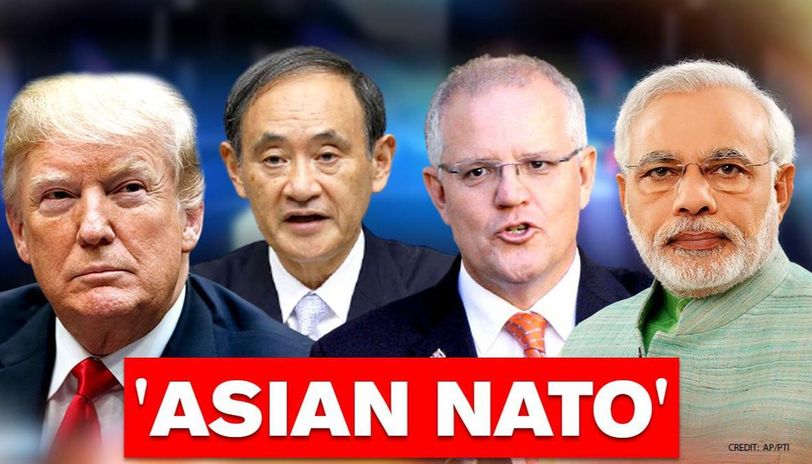We are only too aware that Mike Pompeo is a man on a mission, even now that the presidential elections are only 3 weeks away. Relentlessly, and not even constrained by the Covid cluster outbreak at the White House, he is touring the world to find allies in his fight against the Middle Kingdom. As part of what he calls institutionalising the QUAD to become an entire security framework containing China, he went to Tokyo this week to meet with representatives of its members from Japan, Australia and India.
It was probably only a matter of time for the China hawks to find a catchier designation for the QUAD, one that resonates better with the rest of the world. And one
publication has hit the nail on the head, it appears, and it revealed what Pompeo’s and most likely the Washington establishment’s plans really are. They have simply and provocatively labelled QUAD as the Asian NATO, as in replicating the Western alliance around the Pacific Rim and pull Asian nations into its orbit.
So far, the talk is tough, but can it really be implemented? To be sure, Pompeo’s harsh rhetoric is all about “collaboration to protect our people and partners from the Communist Party’s exploitation, corruption and coercion”, and he presumptuously marks the territory in question being as wide as the “East and South China Seas, the Mekong, the Himalayas and the Taiwan Strait”. Once the four nations had institutionalised their cooperation, others could be added to the “fabric”, or so he says.
But even though the three partners appear to be playing ball with Washington for the time being, big questions remain. While it cannot be assumed that the conflict with China and the containment efforts will be abandoned in case of Joe Biden winning the election, quite the contrary actually, we can equally not know how loyal the partners are and whether they will go all the way. Japan and Australia, in particular, have material commercial interests with China to take into account.
Also, an Asian NATO sounds like a very ambitious project, and it won’t suffice to count the three countries in the region in. But who else is to voluntarily join them or be arm-twisted into an alliance of this sort? I have certainly not seen any of the ASEAN nations wildly interested in taking sides, and there is a decent chance they will do no such thing. South-East Asia is clearly in the orbit of China and likely become a larger part of its ecosystem.
And if such a security framework was to the advantage of American allies in the region, why on earth wouldn’t South Korea be an incremental part of its inaugurating group? Seoul is obviously wary and fully conscious of its relationship with Beijing. It is in fact quite surprising that Washington has not forced Korea into the alliance from the start. It would have been a natural, no? Maybe it isn’t that easy to persuade others of the benefits of what Pompeo envisages here.
However, it would be foolish to think that these are all platitudes. Pompeo, with the newly won support of the Delhi establishment and probably the backing of no other than India’s external affairs minister S Jaishankar, is hard at work chipping away at China’s influence. Mariya Didi, the defence minister of the Maldives, recently went to Washington to sign a strategic cooperation agreement with the Pentagon, in a crass u-turn from the China-friendly Yameen government that got voted out of power in 2018.
This development cannot be underestimated. The Maldive islands stretch deep and imperviously into the Indian Ocean, and the mini-state might just have become a natural extension of Diego Garcia, the island that has served as the key US air force base, so far predominantly facilitating military missions in the Middle East. This means that the world’s most important maritime trade route around the Indian Subcontinent is increasingly under the control of US forces.
In addition, it transpires that Washington and Delhi are aligning to put pressure on the newly elected and traditionally China-friendly Rajapaksa government in Sri Lanka, to disrupt Belt and Road projects there and lure the country into the QUAD. The Rajapaksa brothers, one president, one prime minister, are known to be shrewd politicians, however. They know their country needs China and its investments to prosper, but the pressure is on, and who is to say that there isn’t a price for everything.
China’s leaders, on the other hand, will not be sitting on their hands and look on. Wooing ASEAN on commercial grounds will only be intensified. Seoul and Tokyo will evermore be on the top of Beijing’s calling list. Australia may well experience China’s continued wrath in terms of trade constraints. India’s deviation from its tried-and-tested non-alignment policy and Delhi’s apparent throwing themselves at Washington will only further India’s paranoid perception of Chinese encirclement.
What other choice is there but for Beijing to even more aggressively court Colombo and step up the build-out of the Hambantota port to potentially expand its capabilities to protect China’s crucial trade routes? Equally, what other choice does Beijing have but to tighten its relationship with Pakistan even further and rapidly develop the port of Gwadar as a means to pivot into the Arabian Sea? Also, the flourishing ties with Iran might well be a natural progression and the port of Chahabar there play a similar role.
The buzzword Asian NATO may have a flair ringing to it among Western hawkish circles, but the consequences seem to be far-reaching and incalculable with regards to the geopolitical stability in the region and across the world. The situation increasingly reminds of a chess clock where either side is frantically making their moves to put the burden of time onto the other. Let’s just hope this won’t invite grave mistakes and lead to irreversible confrontation.
